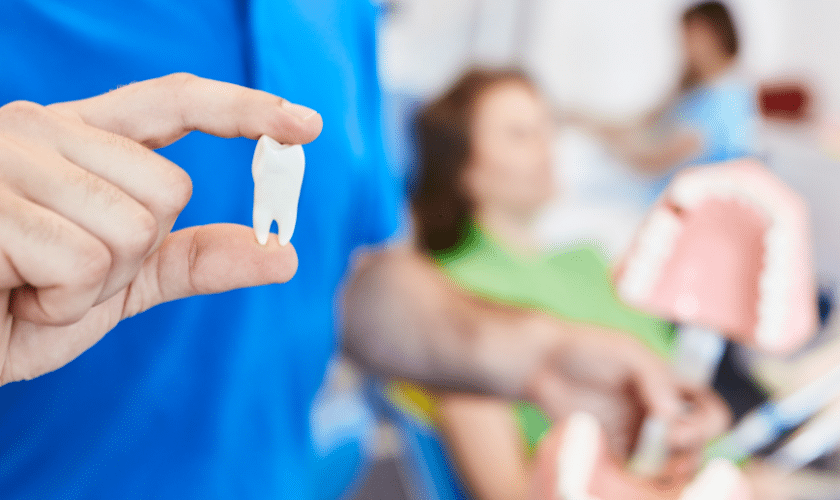Published on July 15, 2024

Tooth extraction might sound daunting, but with the right preparation and care, you can ensure a smooth and speedy recovery. Whether you’re dealing with wisdom teeth, severe decay, or other dental issues, understanding the extraction process and post-care tips is essential. This guide will walk you through everything you need to know to feel confident and prepared.
In this blog, we’ll cover why tooth extraction might be necessary, how to prepare for the procedure, and crucial aftercare steps. We’ll also discuss what to avoid during recovery and when to contact your dentist.
Ready to learn how to take the best care of yourself before, during, and after a tooth extraction? Let’s dive in and make this experience as stress-free as possible!
Understanding Tooth Extraction
Tooth extraction might seem intimidating, but sometimes it’s necessary for your overall dental health. There are two main types of tooth extractions: simple and surgical. Simple extractions involve removing visible teeth with forceps. Surgical extractions are more complex and might require an incision to remove a tooth that hasn’t fully erupted or has broken off at the gum line.
Common Reasons for Tooth Extraction:
- Severe Decay: When a tooth is too damaged to be saved by a filling or crown.
- Infection: If tooth decay or damage extends to the pulp, bacteria can enter the pulp, leading to infection.
- Crowded Mouth: Sometimes, teeth need to be removed to prepare the mouth for orthodontic treatment.
- Gum Disease: Advanced periodontal disease can loosen teeth, necessitating extraction.
Knowing why an extraction might be needed helps alleviate some of the anxiety and prepares you for the next steps in maintaining your oral health.
Pre-Extraction Preparation
Preparation is key to a smooth tooth extraction experience. Start by having an open conversation with your dentist about the procedure. Ask about what to expect, the type of anesthesia they will use, and any potential risks or complications. This knowledge empowers you and reduces anxiety.
Steps to Take Before the Procedure:
- Follow Pre-Op Instructions: Your dentist might ask you to avoid eating or drinking for a few hours before the extraction.
- Arrange Transportation: If you will receive sedation or general anesthesia, arrange for someone to drive you home.
- Wear Comfortable Clothing: Dress in loose, comfortable clothes for the procedure.
Mental and Physical Preparation:
- Stay Calm: Practice relaxation techniques like deep breathing or meditation to calm your nerves.
- Get Rest: Ensure you get a good night’s sleep before the procedure.
Proper preparation sets the stage for a smooth extraction and recovery process.
Immediate Aftercare
What you do immediately after a tooth extraction significantly impacts your recovery. Start by following your dentist’s instructions carefully. They will likely recommend biting down on a gauze pad to stop the bleeding. Replace the gauze as needed and avoid disturbing the extraction site.
Foods and Drinks to Avoid:
- Hot and Spicy Foods: These can irritate the extraction site.
- Alcohol and Tobacco: Both can delay healing and increase the risk of infection.
- Straws: Avoid using straws, as sucking can dislodge the clot and cause dry socket.
Managing Pain and Swelling:
- Ice Packs: Apply an ice pack to the outside of your cheek for 15 minutes at a time.
- Pain Medication: Take any prescribed pain medication or over-the-counter pain relievers as directed.
- Saltwater Rinse: After 24 hours, rinse your mouth gently with salt water to reduce swelling and keep the area clean.
By following these steps, you can ensure a smoother and faster recovery.
Maintaining Oral Hygiene Post-Extraction
Keeping your mouth clean after a tooth extraction is crucial for preventing infection and promoting healing. However, you must be gentle around the extraction site to avoid disturbing the clot.
Proper Brushing and Flossing Techniques:
- Brush Gently: Brush your teeth gently, avoiding the extraction site. Use a soft-bristled toothbrush to prevent irritation.
- Floss Carefully: Continue to floss your teeth, but be cautious around the extraction area.
Importance of Keeping the Extraction Site Clean:
- Avoid Mouthwash: Refrain from using mouthwash for the first 24 hours. After that, use a saltwater rinse instead.
- Stay Hydrated: Drink plenty of water to keep your mouth clean and hydrated.
Recommended Dental Products:
- Soft Toothbrush: Use a toothbrush with soft bristles to minimize irritation.
- Non-Alcoholic Mouthwash: After a few days, switch to a non-alcoholic mouthwash to keep your mouth clean.
Maintaining oral hygiene helps prevent complications and speeds up the healing process.
Foods and Activities to Avoid

Certain foods and activities can hinder your recovery and should be avoided during the healing process. Knowing what to steer clear of ensures you don’t accidentally cause harm.
Foods to Avoid:
- Crunchy and Hard Foods: Nuts, chips, and hard candies can irritate or dislodge the clot.
- Sticky Foods: Caramel, gum, and other sticky foods can pull at the extraction site.
- Hot and Spicy Foods: These can cause irritation and discomfort.
Activities to Avoid:
- Strenuous Exercise: Avoid heavy lifting and vigorous exercise for at least 24-48 hours to prevent increased blood pressure and bleeding.
- Smoking and Alcohol: Both can delay healing and increase the risk of infection.
How These Can Affect Healing?
- Dry Socket: Sucking actions, like using a straw or smoking, can dislodge the clot, leading to a painful condition called dry socket.
- Infection: Poor food choices and certain activities can introduce bacteria to the extraction site, causing infection.
Avoiding these foods and activities will help you heal faster and with fewer complications.
Long-Term Recovery Tips
Your recovery continues long after the initial healing phase. Long-term care ensures that your mouth heals properly and you avoid any complications.
Signs of Proper Healing:
- Reduced Swelling: Swelling should decrease after the first few days.
- Decreased Pain: Pain levels should gradually diminish over time.
- Healthy Gum Tissue: The extraction site should begin to close up and look healthy.
When to Resume Normal Activities?
- Gradual Return: Gradually return to your normal activities, starting with light exercise and slowly increasing intensity.
- Normal Diet: Reintroduce harder foods into your diet as your mouth heals, but continue to avoid anything that could disrupt the site.
What to Do if Complications Arise?
- Persistent Pain: If pain persists or worsens, contact your dentist Richmond.
- Signs of Infection: Look out for excessive swelling, fever, or pus around the extraction site. These symptoms require immediate dental attention.
Staying mindful of these long-term recovery tips helps ensure a smooth and complete healing process.
When to Contact Your Dentist?
Knowing when to reach out to your dentist can prevent minor issues from becoming major problems. Always err on the side of caution and seek professional advice if something doesn’t feel right.
Warning Signs to Watch For:
- Excessive Bleeding: If bleeding continues for more than 24 hours or is heavy, contact your dentist.
- Severe Pain: Severe or worsening pain that doesn’t respond to medication needs professional evaluation.
- Signs of Infection: Symptoms like fever, chills, or foul taste in the mouth indicate a possible infection.
Common Post-Extraction Issues and How to Handle Them:
- Dry Socket: If you suspect a dry socket, contact your dentist for a treatment plan.
- Loose Sutures: If your stitches come loose, your dentist might need to replace or remove them.
Importance of Follow-Up Appointments:
- Check Healing: Follow-up visits allow your dentist to ensure proper healing and address any concerns.
- Professional Advice: Use these appointments to ask any questions and get professional advice tailored to your situation.
Proper care before and after a tooth extraction ensures a smooth recovery and prevents complications. Follow your dentist’s advice, maintain good oral hygiene, and avoid harmful foods and activities. Stay vigilant and seek professional help if needed to promote healing and overall dental health.
